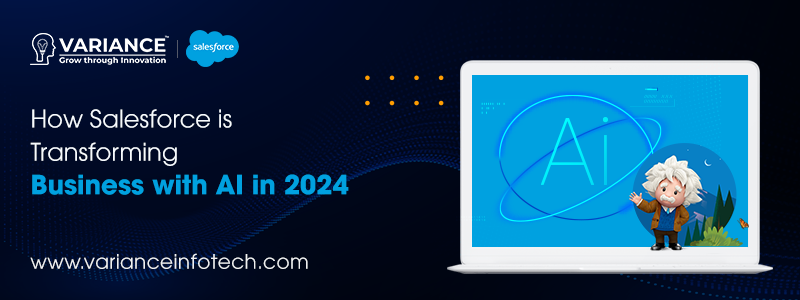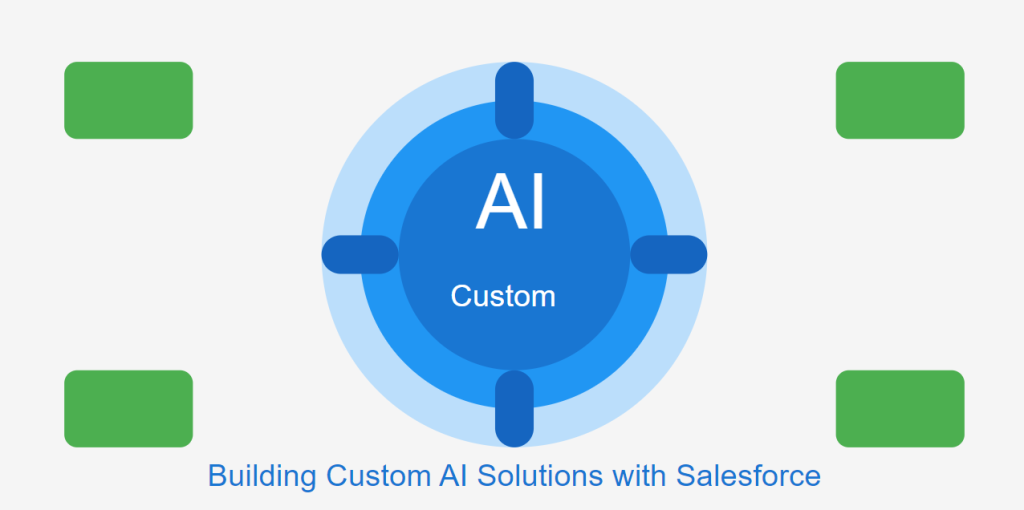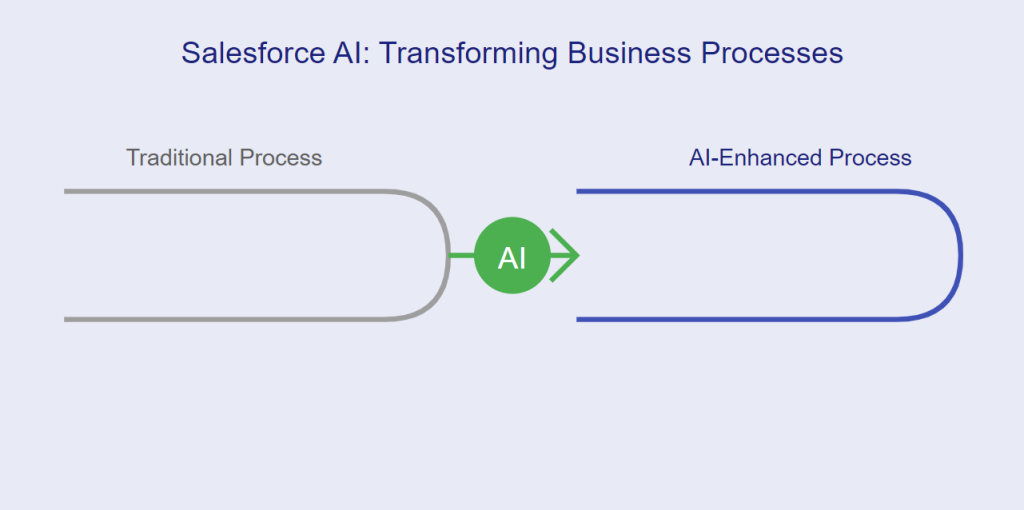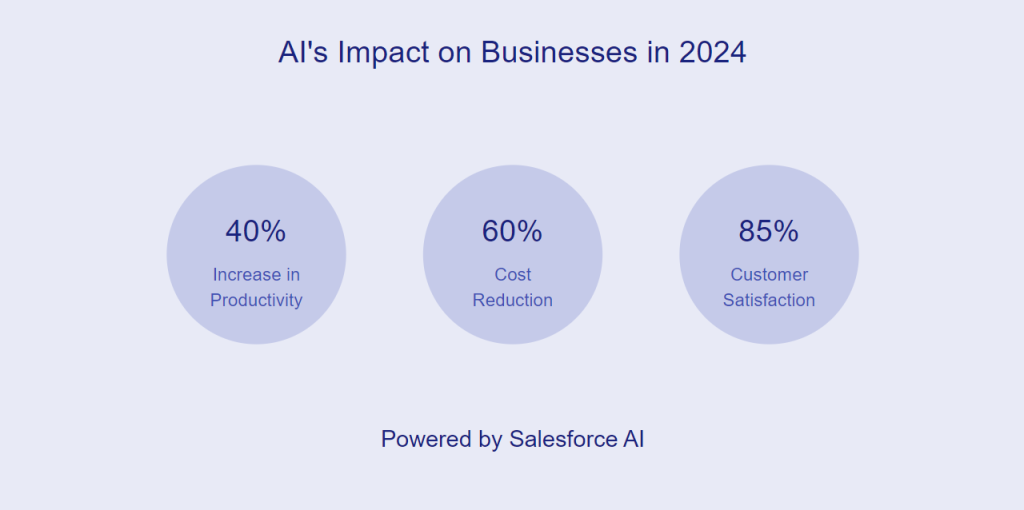
The Integration of Agentic AI in Salesforce
Transforming Business Processes:
Through its creative Agentforce platform, Salesforce is leading the pack when it comes to the adoption of Salesforce AI in various operational processes. This enables companies to adopt the agentic model of AI and automate non-trivial processes and centralize procedures. Thanks to the companies’ advanced tools, it is now possible to design AI agents who will be able to operate autonomously and make their own decisions. However, this shift in the nature of work allows companies to focus less on repetitive tasks in order to save time and other resources and enhance activities that boost productivity.
To take one example, it also helps in generating a diagram of tasks performed automatically and formed into an ‘org chart’ where every AI agent works together without uttering a word and only looks for humans when a task requires one. This does not only build up the desirable know-how and skills but also enables skilled labour to be spared for essential and high value projects.
Customer Interactions:
Another critical component of Salesforce AI is customer interactions enhancement. With the assimilation of agentic AI, this makes it possible for businesses to provide individualized services to their clients. Automated agents can handle questions, address problems and even make predictions about the requirements of clients based on previous information. This improves customer satisfaction and increases the retention of the customers to the brand.
With AI agents, companies have the opportunity to understand their customers better.
For instance, OpenTable uses the agents for making improvements in account management and reservation management. Where there are cases of concerns by customers, AI agents can respond immediately, thanks to a reduced waiting period hence no inconveniencing to the service experience.

Building Custom AI Solutions:
Salesforce’s low-code tools enable organizations to create their own AI applications that meet their needs. These tools are great by ensuring that any adjustments can be made without technical help from the users including developing, implementing and managing AI agents. If these skills are adopted by the companies, they can be able to change and create new forms in the required time followed by the changing market thus gaining a competitive advantage in that field.
Predictions for AI Impact on Work
Estimation of the Achieved Outcomes:
With the use of Salesforce AI becoming increasingly prevalent within organizations, a new way of productivity measurement is expected which is a shift. Instead of inputs it Foresight is likely to turn to outcomes more, particularly the worth that has been created through more processes. The outcome desired would be evaluation on the extent in which AI practices have been implemented and the benefits out of these institutions.
Reducing Boring Tasks:
Contrasting agents also predict that there shall be a radical change in the organizations where agentic AI is implemented in that, most cheap repetitive activities shall also be automated. Employees find more creative activities that demand thoughtful work instead of busywork because they can assign simple and routine tasks to AI agents. This change in dynamic builds a creative and cooperative company culture.
Impact on Workplace Culture:
At workplaces where AI has been incorporated into the activities of the organization, the values espoused by the employees are also likely to change. Employees and AI agents will operate in a collaborative structure. This will cultivate an atmosphere where both human efforts and AI work are cherished, resulting in better cooperation and contentment on one’s job.

Generative AI’s Role in Business Innovation
Implementing Across Functions:
Generative AI will be introduced across the various business departments and implement them in the ways in which the structural operatives would be affected. There are uses for generative abilities in sales, customer service or even marketing in organizations. Integration of artificial intelligence among the various functional areas eases communication channels and enhances coordination.
Adopting Customer Centric Models:
With the effective usage of Salesforce AI, organizations are now able to create customer-centered strategies. Companies will now focus on the customer experience rather than metrics and temper their offering depending on what the market and customer behavior demand. This helps in ensuring companies are always upbeat with the changes that take place in the surrounding.
Gaining Competitive Advantage:
Organizations that effectively implement agentic AI stand to gain significant competitive advantages. By streamlining operations, enhancing customer engagement, and promoting innovation, these businesses can position themselves as industry leaders, poised to outperform competitors who lag in AI adoption.
Ensuring Trust and Data Security in AI
Ethics In Focus:
There has been an increasing use of AI with it, arising ethical issues revolving data and decision taking processes. Businesses will at some point have to deal with such implications if they are to remain trusted by their customers. Salesforce AI highlights the significance of adopting ethical frameworks in technology development and urges institutions to heed the moral use of technology.
Developing Unified Data Strategies:
For an organization to be able to generate effective use of AI capabilities, a man in the middle data strategy is imperative on the organization. Enough protocols of collecting, storing, and using data should be set in an organization which is necessary for the effectiveness of AI and compliance to laws and good ethics.
Building Trust in AI Based Solutions:
In the end, trust, demand as well as accountability is what will determine the prospects and growth of AI solutions. Users should know what information is being used in relation to them and how judgment pertaining to them is made by the intelligence. That level of understanding will promote broader encouragement and use of AI technology in different sectors.

Real-World Applications of Salesforce AI
Customer Stories of Success:
Many companies have seen significant improvements using Salesforce AI.
For instance, educational publisher Wiley experienced a significant boost in case resolution rates, achieving a 40-50% increase with their use of AI agents. Similarly, Wyndham Resorts utilized AI to integrate their data systems, expecting a substantial reduction in call resolution times, thereby enhancing customer support.
For instance, educational publisher Wiley experienced a significant boost in case resolution rates, achieving a 40-50% increase with their use of AI agents. Similarly, Wyndham Resorts utilized AI to integrate their data systems, expecting a substantial reduction in call resolution times, thereby enhancing customer support.
Improvements in Customer Engagement:
The success stories extend to improved customer engagement. Organizations like Heathrow Airport have implemented AI-driven solutions to streamline their customer service processes. By employing chatbots to handle common inquiries, they have freed human agents to focus on more complex customer needs, ultimately enhancing passenger experience.
Increasing Employee Efficiency:
In addition to improving customer interactions, Salesforce AI is instrumental in boosting employee efficiency. Companies like Aston Martin have reduced redundant data handling by unifying their datasets, allowing employees to leverage comprehensive insights for facilitating better customer experiences. Such improvements lead to greater responsiveness and agility within the workforce.
The Future Landscape of AI and Business
Next-Gen AI Solutions:
The Next-generation AI solutions will soon tackle complex tasks, improving operations. Businesses must adapt to technological changes, addressing challenges like data security and AI ethics.
Navigating Technological Shifts:
As technology advances, organizations must be able to deal with these changes. Implementing AI is no longer an option for businesses looking to stay competitive. They will face challenges such as data security, questions of ethics, and the management of AI human interactions.
Sustainable Business Practices:
Salesforce AI promotes sustainability by optimizing resource allocation and minimizing waste. This aligns with growing demands for corporate responsibility and environmental stewardship.
In summary, Salesforce AI transforms businesses, streamlining processes, enhancing customer interactions, and changing workplace culture. As companies adopt these capabilities, the future of work becomes more innovative, efficient, and customer-focused.
Reference:
Do You Need more information?
For any further information / query regarding Technology, please email us at info@varianceinfotech.in
OR call us on +1 630 534 0223 / +91-7016851729, Alternately you can request for information by filling up Contact Us
 Please wait...
Please wait...
Leave a Reply